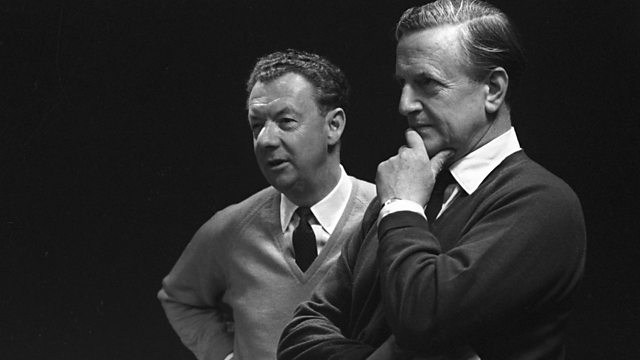Britten Books, Ruhrtriennale Festival
Sara Mohr-Pietsch discusses 2 books on Benjamin Britten, one about his relationship with Russia and the other, correspondence with Peter Pears. Also a trip to the Ruhrtriennale.
Last on
More episodes
Chapters
-
Britten in Books: ‘Benjamin Britten and Russia’ by Cameron Pyke, and The letters of Benjamin Britten and Peter Pears
Duration: 19:53
At the Ruhrtriennale festival in Germany
Duration: 22:52
Britten in Books: ‘Benjamin Britten and Russia’ by Cameron Pyke, and The letters of Benjamin Britten and Peter Pears
Music Matters returns for a new season with a fresh look at the life and work of Benjamin Britten. As two new books are published about the British composer, academics Marina Frolova-Walker and Gerard McBurney talk to Sara Mohr-Pietsch about Britten’s links with Soviet Russia in the middle of the Cold War – particularly his relationship with Shostakovich, and his enduring friendship among others, with cellist Mstislav Rostropovich, for whom he wrote a number of pieces, including his Cello Symphony. Our experts also delve into a new compilation of letters - the entire surviving correspondence between Britten and his partner, the tenor Peter Pears. The letters reveal how they saw the world around them as well as offering an insightful view of how their personal relationship informed their artistic lives. ����ý’s archive material is used to illustrate these compelling topics.��
More information:
��
Photo: Benjamin Britten (L) and Peter Pears © ����ýAt the Ruhrtriennale festival in Germany

Sara Mohr-Pietsch takes a trip to the Ruhrtriennale arts festival. Based in Germany’s industrial North-West, the festival stages theatre, music and dance as well as exhibiting art installations in former factories and warehouses across the region. Sara talks to its Music Director Johan Simons, whose motto for the festival is ‘Seid umschlungen’, ‘Be Embraced’, taken from Schiller’s Ode to Joy with a view to challenging the meaning of European identity today. Striving to be attuned to the latest developments in the continent, this year’s Ruhrtriennale attempts to respond to the migrant crisis and its impact in Germany. Sara samples performances touching upon these topics, like ‘Nicht Schlafen’ – ‘Don’t Sleep’, a dance piece by choreographer Alain Platel using the music of Mahler; a music theatre piece by Johan Simons himself called ‘Die Fremden’, ‘The Foreigner’, created with conductor Reinbert De Leeuw and using music by Ligeti, Kagel and Claude Vivier; and a project named ‘Urban Prayers’, which visits places of worship - Christian, Muslim, Hindu - around the Ruhr region seeking bridges between this now multi-ethnic community.��
More information:
��
Photo: Ruhrtriennale festival poster © ����ý��Credits
| Role | Contributor |
|---|---|
| Presenter | Sara Mohr-Pietsch |
| Interviewed Guest | Gerard McBurney |
| Interviewed Guest | Marina Frolova-Walker |
| Interviewed Guest | Johan Simons |
Broadcasts
- Sat 17 Sep 2016 12:15����ý Radio 3
- Mon 19 Sep 2016 22:00����ý Radio 3
Knock on wood – six stunning wooden concert halls around the world
Steel and concrete can't beat good old wood to produce the best sounds for music.
The evolution of video game music
Tom Service traces the rise of an exciting new genre, from bleeps to responsive scores.
Why music can literally make us lose track of time
Try our psychoacoustic experiment to see how tempo can affect your timekeeping abilities.
Podcast
-
![]()
Music Matters
The stories that matter, the people that matter, the music that matters


